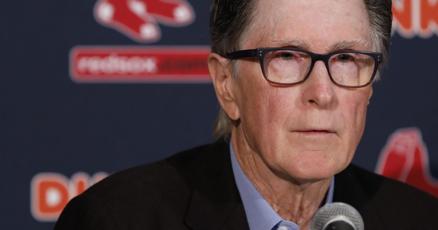
Perhaps you saw the video from this past weekend.
New York Mets owner Steve Cohen, seated as part of a panel on stage at his team's winter Fan Fest, explained to the masses why it was unlikely that popular free agent Pete Alonso would be re-signed.
Minutes earlier, David Stearns, his president of baseball operations, had been interrupted and booed when he attempted to speak, with chants of "Re-sign Pete!"
Cohen then took over the microphone and the conversation.
"We made a significant offer to Pete. I don't like the structures that are being presented back to us," said Cohen, in a reference to negotiations with Alonso's representative, Scott Boras. "I think it's highly asymmetric against us and I feel strongly about it. And so, I will never say 'no' -- there's always a possibility. But the reality is, we're moving forward. As we continue to bring in players, the reality is it becomes harder to fit Pete into what is a very expensive group of players that we already have. That's where we are. And I'm being brutally honest."
With that, the fan sentiment began to shift. What had been an agitated crowd, peeved that a popular homegrown player would likely not be retained, was suddenly a bit more sympathetic, as some in the crowd began to applaud Cohen's remarks.
That wasn't that difficult, was it? All it took was some plainspoken rationale. Fans might not like the likely result of the Alonso negotiations, but they can at least appreciate the candid explanation from the man who takes their hard-earned money.
Are you listening, John Henry?
And before you explode, let's address the obvious: Yes, it's a lot easier to win over a fan base after you've overseen payrolls that top $300 million in three consecutive seasons, and you just two months ago won a bidding war for Juan Soto, the most expensive free agent in history.
But Cohen earned that goodwill on his own. He put his money behind his promise to field a team of which his fan base could be proud. And now he's reaping the benefits. They trust him.
Contrast that to how Red Sox fans feel about Henry, who has dramatically slashed spending over the last five years, and to make matters worse, become something of a recluse. In a few weeks, it will be five full years since Henry fielded questions in a press conference setting.
Henry's silence speaks volumes, or at the very least, sends an unmistakable message to the fan base. That message? You're not important.
It suggests that Henry has better things to do than explain to the masses why decisions are being made when it comes to the franchise for which he remains principal owner. He's decided to leave that to others.
It wasn't always like this, of course. For the first 10 or so years of his tenure, Henry would show up and weigh in on all manner of issues: personnel, spending, front office changes, ballpark improvements, etc. It was part of the duty he felt being owner of this team he more than once dubbed "a public trust."
It was easier to be accountable when things were going well, when the team was winning three World Series and Henry was the toast of the town. But starting in 2014, the team began a boom-bust cycle that has led to more last-place finishes (five) than playoff appearances (four) in the last 11 seasons.
Worse, fan perception is such that Henry has very nearly become an absentee owner, a characterization that has little to do with how often he's at the ballpark (more than you'd think) and more to do with his emotional distance. Henry seems far more invested -- literally and figuratively -- in his other business interests. The same guy who would write lengthy, passionate emails in the middle of the night following a harrowing loss in May now sends the signal he can't be bothered with what the masses think.
No one is suggesting that Henry match Cohen dollar for dollar when it comes to payroll. Even in an exclusive club like MLB's billionaire owners, Cohen's net worth puts him in a class of his own. And while Cohen is desperate to deliver the Mets' first World Series trophy in almost 40 years, Henry's Red Sox, it should be noted, have already won four in the last two decades, for which he should be commended.
But those days seem like a long time ago for Red Sox fans, who are rightly left to wonder how long it might be before they can celebrate again. The last two offseasons have begun with promises of a more vigorous spending approach, only to fall short of expectations.
This winter, the team upgraded its starting rotation, then mysteriously did little else despite some obvious roster shortcomings. With two weeks before the start of spring training, the Red Sox' rebuild looks like something a couple of frustrated parents began in earnest but soon abandoned very late on Christmas Eve, the pieces scattered everywhere.
Why? We're left to only speculate.
The Red Sox principal owner, again, offers no answers and provides no details. That's for others, apparently, who respect their fans enough to do so.